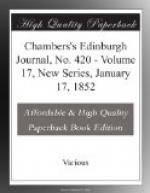In his retirement at Stockton, Jackson put forth two valuable works, one on the medical economy of armies, and another on that of the British army in particular, and was much gratified by an offer to accompany, as military secretary, General Simcoe, just appointed commander-in-chief in India. The general’s sudden death, however, put an end to this plan; and Jackson continued at Stockton, addressing frequent representations to government on the defective medical arrangements in the military service—representations the very receipt of which were not acknowledged by Mr Pitt, to whom they were forwarded. The Peninsular war commencing, Dr Jackson was again named Inspector of Hospitals, but was not, thanks to the persevering enmity of the Medical Board, sent on foreign service, although he volunteered to sink his rank, and go in any capacity. The Board even succeeded, by calumnious statements that he had purchased his diploma—statements he readily confuted—in preventing his appointment to the Spanish liberating army; although the British government had formally requested him to accept such an appointment, and agreed to give credentials testifying to his capacity and trustworthiness. This last disappointment led him, in an unguarded moment—peppery to the last—to inflict a slight personal chastisement on the surgeon-general, for which he was imprisoned six months in the King’s Bench.
But the triumph of his enemies was not of long duration. In 1810 the Board was dissolved, and the control of the medical department vested in a director-general, with three principal inspectors subordinate to him. Then did Jackson return to active service, and from 1811 to 1815 was employed in the West Indies; his reports from whence embracing every topic relating to medical topography, to sanitary arrangements, and to the observed phenomena of tropical disease, are it is not too much to say, invaluable. His hints as to the choice of sites for barracks, the propriety of giving to soldiers healthy employment and recreation, as a means of averting sickness, his suggestions as to the treatment of fevers and other endemic diseases, may be found in the various works he has published, embodying the fruits of his West Indian experience.




